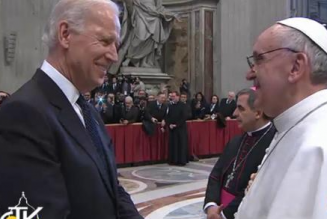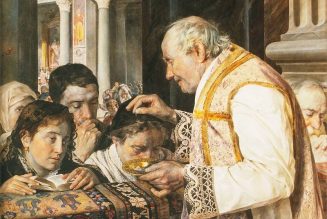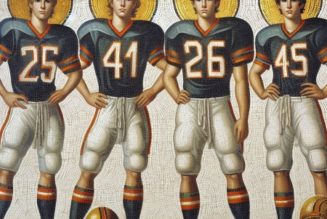
Among U.S. Catholics, Catholic social teaching has become a fashionable subject, and some of those who talk about it have actually studied it. But it’s not really all that useful without some expertise in a second subject, which we might call Catholic political thinking. The first imposes principles and a way of understanding our engagement with the world, but these don’t tell us how to make them a reality in the very complex and concrete realities of political life.
Many Catholics who know something about the first are abysmally bad at the second. Often those who have the strongest political opinions are as innocent as babes of actual political thinking. Which does not, however, prevent them from delivering their political opinions with mic-drop certainty.
This is a pan-ideological and an ecumenical problem. Politically liberal and politically conservative Christians both talk this way.
A Liberal Example
For example, last year social media sprouted with memes suggesting that God’s forgiving our debt justifies the federal government removing student debt. It was a “Gotcha!” kind of slogan. The sloganeers aimed it at those who objected to the government giving people money to get them out of a jam they’d chosen to get into and from which many benefited, to be paid for in part by people who hadn’t gotten themselves into that jam.
The memers were making a claim about a political problem, but they failed to think about it politically. Their claim had nothing to say about the difficult practical — the specifically political — questions. Questions, for example, about whether it is right or wise to remove one particular kind of debt (and importantly not other kinds of debt), held by some groups of people (and importantly not by others), accepted for one particular need (and importantly not others), and imposed by one branch of one level of government (which does not have the money).
It said nothing about the wisdom of a payment that leaves untouched the system that created that debt and keeps unchanged the incentives for schools and students to spend too much money. And nothing about the justice of a remedy whose costs will be borne by people who did not incur that debt and whose own economic struggles remain unaddressed.
The memers plainly did not even notice that the proposal served a more powerful class — generally theirs, as far as I could see — at the expense of a less powerful one. That inequity seems to me the opposite of what Catholic social teaching requires.
The meme had nothing to say about whether or not the federal government should forgive student loans. The fact that God forgives us doesn’t tell us whether this particular political action is prudent or just or fair, whether it will advance the commonweal or harm it, or even whether it could be done at all.
I wrote about this and got some interesting responses but only one real objection, from someone with some influence who claimed, “He who is not generous with a piddly amount of earthly wealth cannot be trusted with the true wealth.” When challenged, he accused those who opposed the debt relief of being “blind to the gospel and to the command to bear one another’s burdens.”
That’s not political thinking, and not really thinking at all. I responded that most of the people he accused of blindness were making a legitimate argument about the nature of debt and public responsibility to rectify individual choices. He just confused the matter by trying to hit people with Jesus.
A Conservative Example
It is, as I say, a pan-ideological problem and an ecumenical one. Writing in First Things, the Presbyterian theologian Carl Trueman laments how the number of churches and pubs in his native England keeps shrinking and local communities lose their shared places where people meet and share their lives. Nothing could replace them, or at least nothing is replacing them.
I happen to know Carl, and we first met over lunch in an Irish pub in New York City — an old-fashioned pub with a real wood fire and sawdust on the floor, which made that Englishman feel at home. And which was a kind of community center of the sort whose disappearance in England he regrets. He’s a theologian of weight and the author of a substantial study of our condition, The Rise and Triumph of the Modern Self.
“The death of church and pub can only further fuel the modern scourges of loneliness and isolation,” he says. “And these evils cannot be solved directly by public policy or government initiatives because such things trade in abstractions. Nobody is ever lonely or isolated in the abstract. Loneliness only ever affects people — real, individual people in real, particular circumstances. And it can only be solved by real community.”
Well, yes and no. That qualifying “directly,” for example, zips by the political possibility that indirect solutions might solve the problem, partly but significantly, and indeed be necessary to solving it. He says nothing about the possibility of at least making things better. He doesn’t ask what could be done in public policy to sustain or even restore the local institutions whose loss he laments.
He’d already pointed out two of the “numerous reasons” local pubs are closing so fast: “Supermarkets sell cheap wine and beer that can be consumed at home, and the overhead costs and red tape involved in running any such establishment make them less and less attractive as a business opportunity.”
Both these express political choices, choices to encourage one sort of society rather than another, and to privilege some institutions over others. Each choice uses the state’s many instruments — the laws, tax rates, zoning regulations, subsidies, and so on — to choose between institutions, like the pub and the supermarket.
The article takes up a political matter but without actual political thinking. Carl regrets the loss of local institutions that encourage community and fight “the modern scourges of loneliness and isolation.” Instead of throwing up his hands, he should reflect on what might be done to protect those institutions. That is, think politically.
Public Political Problems
To say we must as Christians bear one another’s burdens doesn’t imply that the citizens of the United States must bear these burdens in this way. To say that public policy can’t create real community doesn’t imply that it can’t protect the places where people create that real community. Politically liberal Christians tend to default to a general (and naïve) view of government, politically conservative Christians to a general (and naïve) view of freedom, and stop there.
The two issues, oppressive student loans and closing public houses, are public political problems, problems to be answered in part politically. The Catholic comes to it with a set of principles expressing a distinct conception of the world that point to some policies and away from others, but must go a long way to figure out how to incarnate those principles in the public law and policy.
The difficult questions — and therefore the interesting questions — require thinking about how to apply principles to practice. It’s not rocket science, but it isn’t easy either. It requires a particular kind of thinking, for which not all that many Christians have the gifts, knowledge and experience. The sloganeers never get close to the questions that really matter, that if answered well can change other peoples’ lives for the better.









